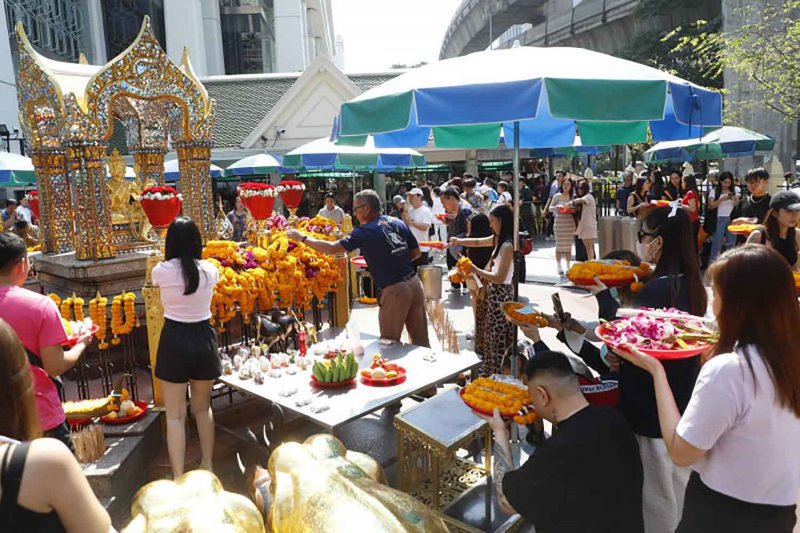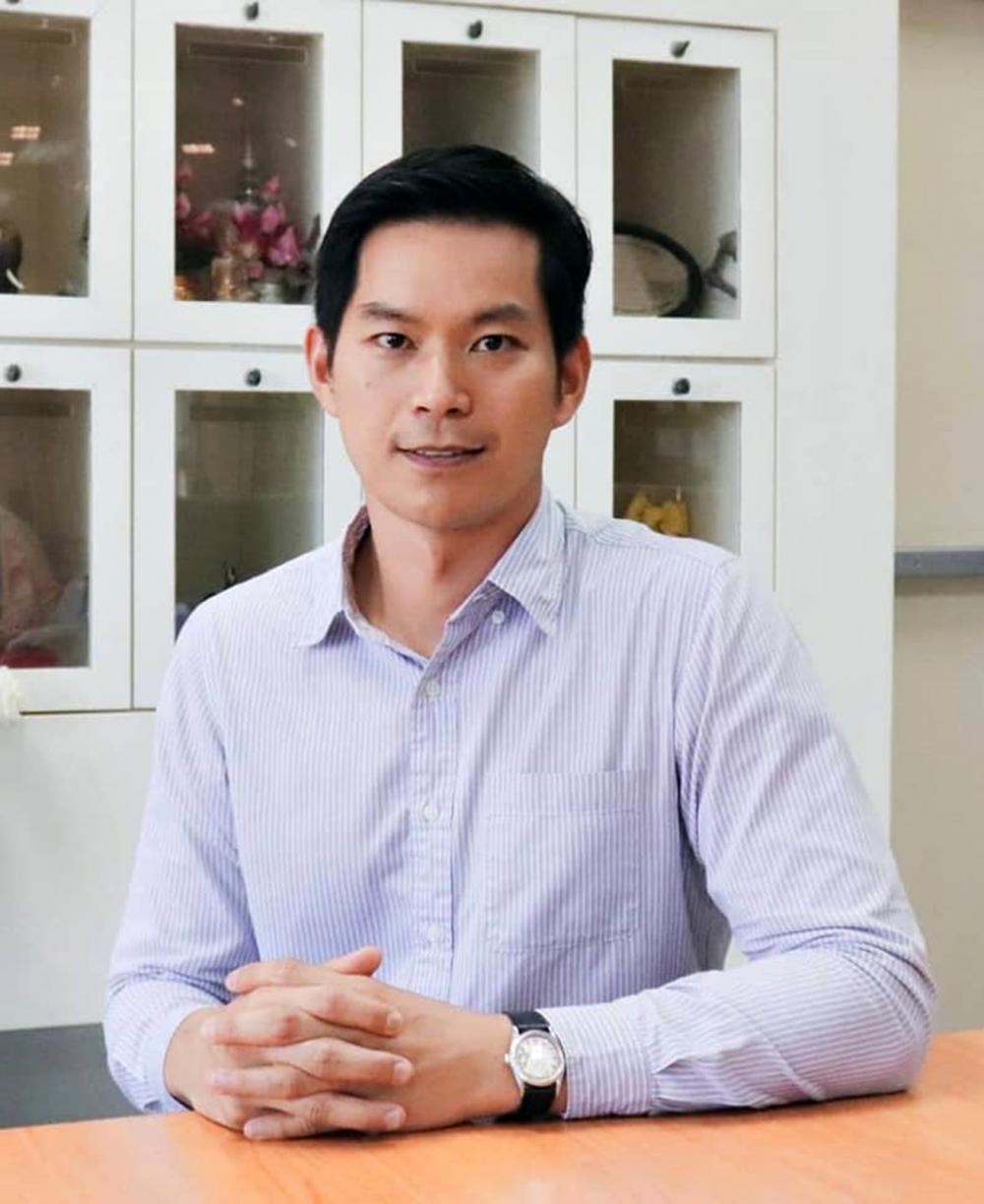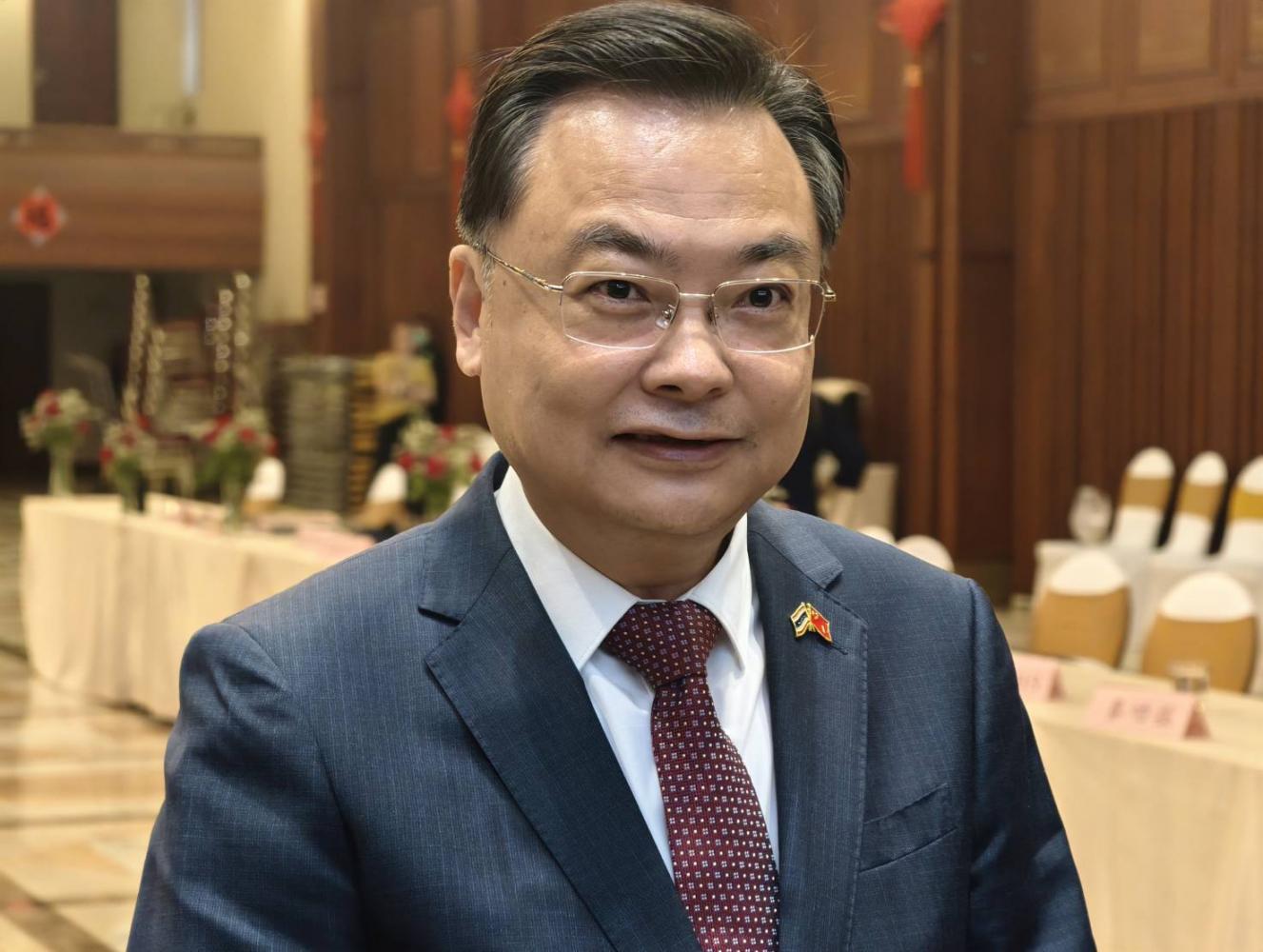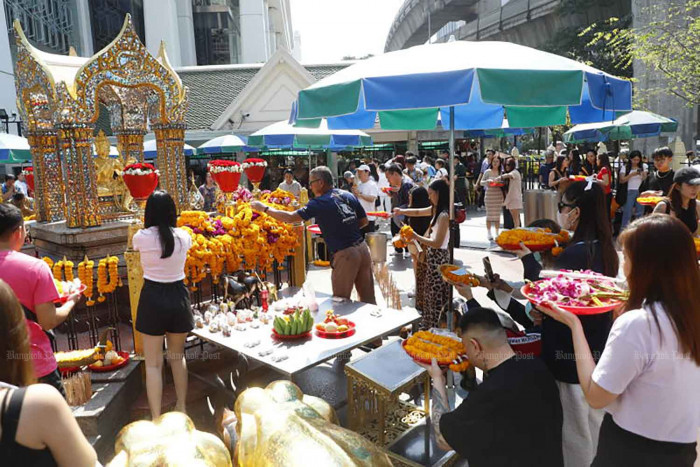
Chinese tourists visit the Erawan Shrine in Bangkok to pray for New Year’s wishes in January. (Photo: Pattarapong Chatpattarasill)
Chinese tourist arrivals to Thailand have dropped sharply this year, testing the new government’s ability to restore confidence in what was once the country’s largest tourism market before the pandemic.
The number of Chinese visitors has fallen by about 35% compared to the same period last year, with 3.3 million arrivals between Jan 1 and Sept 22, says the Tourism Authority of Thailand (TAT).
The slowdown has been attributed to several factors, including safety concerns, growing domestic tourism in China, increased competition from regional destinations such as Japan and Malaysia, and the global economic slowdown. The drop in Chinese group tours has also played a role.
After hitting a low earlier in the year, daily arrivals from China have begun to show signs of stabilisation. During China’s Golden Week holiday from Oct 1–8, arrivals are expected to average 13,000 per day, compared with 8,000–9,500 earlier.
TAT projects that between Sept 26 and Oct 8, about 180,000 Chinese tourists will visit Thailand, possibly exceeding 200,000. Still, this represents a 24% decline from the same period in 2024, when 262,001 Chinese arrivals were recorded.
The decline in arrivals also affects tourism revenue. Spending by Chinese visitors during this year’s Golden Week wlill be 9 billion baht, down 17% from 10.9 billion a year earlier. On average, Chinese tourists spend 6,600 baht per person a day and stay six to eight nights per trip.
The Bangkok Post recently spoke to academics and tourism operators about strategies to restore confidence and attract more Chinese travellers.

Aksornsri: Must address Chinese concerns
Safety as the top priority
Aksornsri Phanishsarn, an economics lecturer at Thammasat University, said Thailand must address Chinese concerns about scams and crime.
“Fears over scam centres and the kidnapping of a Chinese actor earlier this year have deterred visitors. Without stronger safety measures, promotions will have little effect,” she said. She urged Thailand to follow Japan’s example by positioning itself as a premium destination that prioritises safety, quality, and efficient transport, while remaining competitively priced.
Japan’s weaker yen, she added, makes it an attractive destination even though its visa rules are stricter and living costs are higher than in Thailand or Vietnam.
Ms Aksornsri also warned against competing directly with Vietnam, which focuses on group tours with lower spending power. Instead, Thailand should aim to provide a premium but affordable experience, offering standards comparable to Japan at a lower cost.

Surawat: Not solely about safety
Boosting ties with Beijing
Surawat Akaraworamat, adviser to the House committee on tourism, said the decline in Chinese arrivals is not solely about safety.
Closer engagement with Beijing is essential to reversing the drop in Chinese tourism, he said, noting Chinese authorities are not actively promoting Thailand. While outbound Chinese travel is nearing pre-pandemic levels, only a few million visit Thailand, far below the 11 million recorded before the pandemic. Visa-free entries may include business travellers, which inflates arrival figures without boosting tourism revenue.
Mr Surawat urged Tourism and Sports Minister Atthakorn Sirilatthayakorn to strengthen diplomatic and business ties with Beijing and avoid controversial topics such as casinos, cannabis, or zero-dollar tours. He recommended recalibrating Thailand’s promotional strategy in the next four months, moving away from broad “soft power” campaigns toward the “5Fs” — fashion, food, fighting, festivals, and film — offering better opportunities.
“The sector faces heavier burdens now than during the pandemic,” he said. “Back then, activity was largely halted, so costs were minimal. Today, everything is running again, but the number of tourists has not recovered,” he said.

Bhunanan: Still Pattaya’s largest market
Reinventing Pattaya
Bhunanan Patanasin, former president of the Pattaya-Chon Buri Business and Tourism Association, said Chinese visitors remain Pattaya’s largest market, though group tours have declined. Free independent travellers (FITs) are becoming more important, he said.
The city is creating new attractions such as theme hotels, waterparks, media art museums, and Chinese-style entertainment to cater to smaller, higher-spending groups. For the high season, bookings are expected to reach 70% occupancy, mostly from Europe, while Chinese arrivals are down by about 20%.
Mr Bhunanan said he would like the government to help make travel to Thailand more affordable for tourists and to improve the transport system to better handle independent travellers.
After arriving in Pattaya by tour bus, the only options available for tourists are songthaew (shared taxis) and ride-hailing via online apps, he said. He also urged the government to host large-scale international festivals like the electronic music festival “Tomorrowland” to draw global visitors.
In July, the cabinet under Paetongtarn Shinawatra gave the green light to the Ministry of Tourism and Sports bringing Tomorrowland to Thailand, with the festival to be staged at Wisdom Valley in Pattaya, under the ministry’s proposal.

Zhang: Friendly neighbours, important partners
Diplomacy and cooperation
Prime Minister Anutin Charnvirakul on Tuesday attended a reception hosted by the Chinese Embassy in Thailand to mark the 76th anniversary of the founding of the People’s Republic of China. He also delivered a keynote speech.
In his remarks, Mr Anutin reaffirmed the government’s commitment to advancing China–Thailand relations, a message that was warmly received by attendees.
He highlighted the longstanding closeness between the two nations, saying, “China and Thailand are not strangers but family,” while inviting Chinese companies to invest in Thailand and encouraging more Chinese tourists to visit.
Chinese Ambassador Zhang Jianwei underscored the friendship, describing the two nations as “friendly neighbours and important partners.”
He said cooperation in key sectors such as agriculture and tourism has fostered goodwill and laid a solid foundation for strengthening bilateral ties.
Mr Zhang expressed China’s readiness to deepen coordination with Thailand to broaden future cooperation. This year marks the 50th anniversary of diplomatic relations between China and Thailand, celebrated as the “Golden Jubilee of China–Thailand Friendship.”
Under the strategic guidance of their leaders, the strategic cooperative partnership has expanded well.

